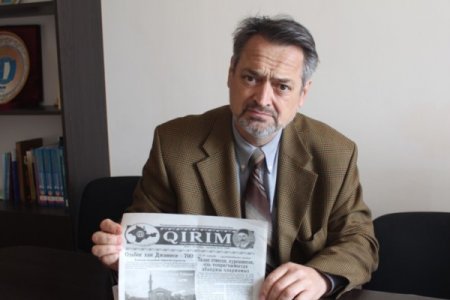
Russian FSB seized Ediye Muslimova in the morning of 21 November in what seemed frighteningly like one of the enforced disappearances Russia brought with its invasion of Crimea. She was held incommunicado, without access to a lawyer and without any admission that she was in FSB custody until late the following evening, 22 November. It is, in fact, possible that it was thanks to international attention, including from two journalist organizations, that she was freed
61-year-old Ediye Muslimova is the Chief Editor of the Crimean Tatar children’s magazine ‘Armanchyk’. As she told the FSB, the magazine survives on the basis of its 1485 subscribers.
It is now known that the journalist was taken away from near her home in the morning of 21 November by FSB officers, who forced her into their vehicle and took her to the FSB building in occupied Simferopol, where she was held without contact with family or lawyer, and without any sleep.
The journalist’s niece had spoken with her at around 11a.m. with Muslimova telling her that she was just finishing off some chores and was heading off to visit her 91-year-old mother (in the village of Soniacha Dolyna near Sudak. The alarm was first raised that evening, when her mother was unable to contact her, and it became clear that both Muslimova’s work and personal mobiles had been switched off. Her car, furthermore, was still parked near her home in Simferopol.
There were very real grounds for concern. Russia has been abducting Crimean Tatars and other Ukrainians since its invasion in 2014, with a number of them vanishing without trace.
The search for Ediye Muslimova began in earnest on 22 November, with relatives learning from a neighbour that she had set off around 11.25 and walked in the direction of her car. Later that afternoon, Crimean Solidarity Coordinator and Graty correspondent Lutfiye Zudiyeva reported that Muslimova had been seen being forced into a vehicle by several individuals, close to where her car was parked.
Graty reports that Muslimova’s niece, Elzara, lodged a formal report about her aunt’s disappearance with the occupation police and also approached the FSB and prosecutor’s office. A different ‘police officer’ from the person who registered the report rang later and asked strange questions, including whether her aunt had crossed into mainland Ukraine and whether she had ‘had problems with the enforcement bodies’. Judging by this and the fact that the ‘police’ did not try to obtain available CCTV footage from around the building, it seems likely that they knew that she had been taken away by the FSB.
Zudiyeva reports that both The Coalition for Women in Journalism and Reporters Without Borders reacted with concern to Ediye Muslimova’s disappearance, demanding that the occupation authorities inform the family of her whereabouts.
It was only on Friday evening, a day and a half after she was effectively abducted from the street that lawyers were able to establish that she was in FSB custody. The FSB’s supposed “conversation” had lasted 36 hours, during which Muslimova was deprived of any sleep and blocked from having her lawyers present. In a twist that may mean the FSB were concerned about the publicity Muslimova’s disappearance had received, she was taken home by the FSB on the evening of 22 November, with these individuals, who had held her incommunicado for so long, handing her a bouquet of roses. She later recounted that they asserted that they had “received a signal” and asked her a huge number of questions about her work, about the magazine. It was “unpleasant”, she said laconically.
Russia has clamped down on all independent media in occupied Crimea, with a huge number forced to close or relocated in mainland Ukraine back in 2014-15. Over recent months, the Crimean Tatar newspaper Qurim, one of the few remaining independent and truthful media, has come under sustained attack. A series of absurd administrative prosecutions have been brought against the newspaper itself, its Chief Editor Bekir Mamutov and founder Seiran Ibragimov, with the aim very clearly to crush the newspaper using crippling fines.
See: Russia uses surreal charges and crippling fines to silence veteran Crimean Tatar newspaper



